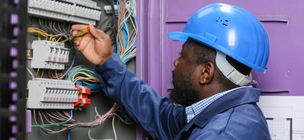Frequent power surges can be disruptive, causing damage to electronics and potentially posing a risk to a home’s electrical system. Power surges are sudden increases in voltage that can overwhelm circuits, damaging appliances or sensitive devices. Understanding their common causes, along with preventive measures, can help reduce the impact of these unexpected events.
Lightning strikes
South Africa experiences a significant amount of lightning, especially during summer thunderstorms, which can cause powerful surges. When lightning strikes near power lines or directly hits a property, it can send an intense current through the electrical system. Even distant strikes can lead to fluctuations that may damage electronics if not adequately protected.
Faulty wiring
Faulty or outdated wiring is another common cause of power surges. Worn or damaged wiring, often due to environmental exposure or pests, creates instability in power flow, leading to small, frequent surges. Older homes are particularly vulnerable due to corroded or loose connections that can disrupt the electrical current.

More information about the price of electrical work can be found in our cost guide.
Electrical overload
An electrical overload happens when too many devices or appliances are drawing power from a single circuit, causing demand to exceed the circuit’s limits. This often results in surges when high-powered devices switch on or off, creating sudden spikes in usage. Homes with older wiring or limited circuits may be especially prone to overloads.
High-powered appliances
Large appliances, like HVAC systems, refrigerators, and pumps, consume a lot of power, especially when cycling on or off. This can create small, localized surges that affect other electronics in the home. Homes with older or lower-capacity electrical systems may struggle to handle the demands of these high-powered devices.
Utility grid issues
Power surges can also originate from the utility grid, especially with grid switching or power line damage. These fluctuations, which are often beyond homeowner control, underscore the need for surge protection. In South Africa, power instability due to load shedding and grid issues is common, making surge protectors an essential investment.
Preventative measures
Reducing surge risk involves a combination of whole-house and outlet surge protectors. Additionally, avoid overloading circuits and ensure regular maintenance of home wiring. In areas prone to thunderstorms, unplugging sensitive electronics during storms can offer extra protection.
Understanding the causes of frequent power surges and taking preventative measures helps safeguard appliances and electronics from unexpected voltage spikes. By addressing potential sources of surges and installing proper protection, a home’s electrical system remains safer and more reliable.
Request a quote for electrician on Procompare today to improve home surge protection!



